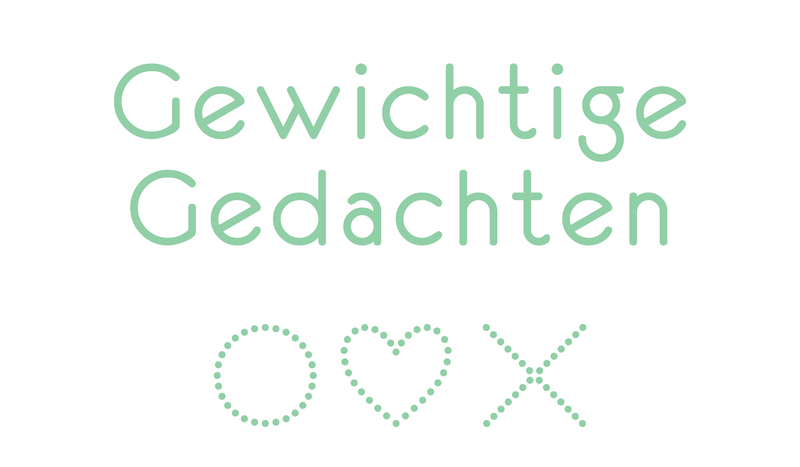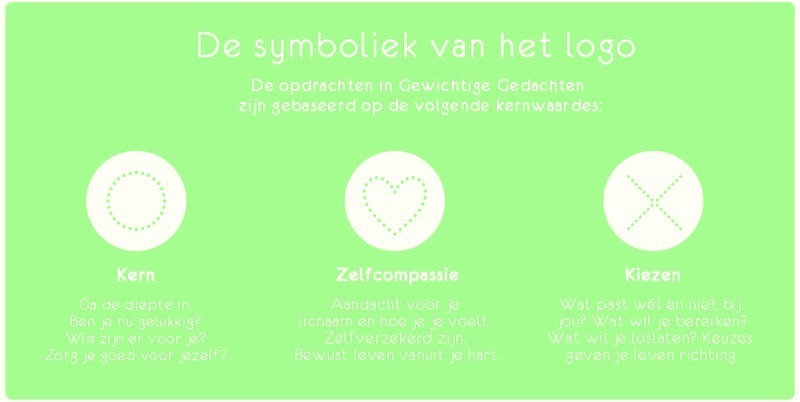Difference between revisions of "Gewichtige Gedachten"
(Created page with "'''Gewichtige Gedachten, Sophie van Bragt''' thumbnail|logo Gewichtige Gedachten was het afstudeerproject voor Grafisch Ontwerpen van Sophie van Bragt...") |
|||
| (34 intermediate revisions by 5 users not shown) | |||
| Line 1: | Line 1: | ||
| − | ''' | + | {{Article |
| − | + | |Image=SymboliekGG.jpg | |
| + | |Summary=Many women are dissatisfied with their weight and focus their attention on the aspects of their body they are unhappy with. This often results in a love-hate relationship with food; various diets are attempted and dropped (the 'yo-yo effect'), or the eventual result is an 'all or nothing' attitude. I decided therefore to develop a positive book for women; a book in which words such as 'lose weight', 'calories' and 'scale' are not used, but which focuses instead on what is necessary to make yourself feel healthy, fit and confident. | ||
| + | |Article=Author: Sophie Bragt | ||
| + | I contacted Frieda, who has a private practice as a weight consultant and coach, helping people who are struggling with their weight or eating behavior. Frieda saw here a long-term opportunity, and together we decided to develop the book and to bring it to market. Through an approach of minimal design, we believe that we can trigger major changes in the unconscious mind of people who have been programmed by a media that advertises the image of 'perfection': being successful, slim and happy. These illusions are not only difficult to achieve but also cause a vicious circle. The book intends to change this process of thinking, using Social Design as a bottom-up strategy. What happens when a perfectionist designer meets a passionate specialist? | ||
| − | Gewichtige Gedachten | + | [[File:SymboliekGG.jpg]] |
| − | + | ||
| − | + | == Gewichtige Gedachten ('Weighty Thoughts') == | |
| − | + | Gewichtige Gedachten is book 'for every woman who wants to lose weight but does not want to diet anymore.' This workbook is aimed at women and intends to change the negative spiral of (too much) food and diets, that often cases the 'yo-yo effect'. This custom-made instruction book focuses on mindfulness and positive psychology; in six weeks, it intends to make readers aware of their eating habits, thoughts and emotions. Each day, readers have to complete a short assignment that motivates, inspires and activates a mindful, healthy life. The aim is to develop more self-compassion and to learn to think more positively. The carefully designed assignments have a gradient from mint green to pink, which symbolises the process of awareness. 'Weighty Thoughts' addresses the theme of accepting the here and now. | |
| − | + | ||
| + | == Discussion == | ||
| + | ''The editorial board invites readers to reflect and react on the following questions:'' | ||
| + | |||
| + | ''Art projects tend to emphasise positive qualities and talents, rather than the negative aspects and shortcomings of specific target groups and/or interest groups. This is often used as a powerful argument as to why artistic interventions are supposed to be more effective than social interventions (which often tend to emphasise problems). The approach of Gewichtige Gedachten seems to be largely based on this claim. But… is this enough to 'trigger major changes in the unconscious mind of people who have been programmed by a media that advertises the image of "perfection"', as Sophie and Frieda claim? Is a bottom-up and positive approach, rather than a top-down and negative approach, really enough to trigger major changes in society regarding – in this case – the perception of beauty, health and happiness? If not, what else can or should be done?'' | ||
| + | |||
| + | ''Sophie (1992), a freelance graphic designer, graduated in 2014 from the Willem de Kooning Academy (Open Design). Weighty Thoughts was her successful graduation project. As a designer, she is fascinated by social issues and the role design can play in these issues. Her focus and ambition are on creative design solutions to problems in the social sector and healthcare.'' | ||
| + | |||
| + | '''Frieda van der Loos-Boudesteijn''' | ||
| + | |||
| + | Frieda (1983) is a weight consultant and coach, with a private practice in Rotterdam since 2007, coaching people who struggle with their weight and body image. She makes use of creative resources | ||
| + | |||
| + | |||
| + | [[File:Logo GG.jpg|logo ]] | ||
| + | }} | ||
| + | {{Links external | ||
| + | |link=http://gewichtigegedachten.nl/ | ||
| + | |displaytext=www.gewichtigegedachten.nl | ||
| + | }} | ||
| + | {{Category selector | ||
| + | |Category=Diversity | ||
| + | }} | ||
| + | {{Category selector | ||
| + | |Category=Participation | ||
| + | }} | ||
| + | {{Category selector | ||
| + | |Category=Graphic Design | ||
| + | }} | ||
| + | {{Articles more}} | ||
Latest revision as of 16:20, 6 December 2017
The wikipage input value is empty (e.g. SomeProperty::, [[]]) and therefore it cannot be used as a name or as part of a query condition.
Author: Sophie Bragt
I contacted Frieda, who has a private practice as a weight consultant and coach, helping people who are struggling with their weight or eating behavior. Frieda saw here a long-term opportunity, and together we decided to develop the book and to bring it to market. Through an approach of minimal design, we believe that we can trigger major changes in the unconscious mind of people who have been programmed by a media that advertises the image of 'perfection': being successful, slim and happy. These illusions are not only difficult to achieve but also cause a vicious circle. The book intends to change this process of thinking, using Social Design as a bottom-up strategy. What happens when a perfectionist designer meets a passionate specialist?
Gewichtige Gedachten ('Weighty Thoughts')
Gewichtige Gedachten is book 'for every woman who wants to lose weight but does not want to diet anymore.' This workbook is aimed at women and intends to change the negative spiral of (too much) food and diets, that often cases the 'yo-yo effect'. This custom-made instruction book focuses on mindfulness and positive psychology; in six weeks, it intends to make readers aware of their eating habits, thoughts and emotions. Each day, readers have to complete a short assignment that motivates, inspires and activates a mindful, healthy life. The aim is to develop more self-compassion and to learn to think more positively. The carefully designed assignments have a gradient from mint green to pink, which symbolises the process of awareness. 'Weighty Thoughts' addresses the theme of accepting the here and now.
Discussion
The editorial board invites readers to reflect and react on the following questions:
Art projects tend to emphasise positive qualities and talents, rather than the negative aspects and shortcomings of specific target groups and/or interest groups. This is often used as a powerful argument as to why artistic interventions are supposed to be more effective than social interventions (which often tend to emphasise problems). The approach of Gewichtige Gedachten seems to be largely based on this claim. But… is this enough to 'trigger major changes in the unconscious mind of people who have been programmed by a media that advertises the image of "perfection"', as Sophie and Frieda claim? Is a bottom-up and positive approach, rather than a top-down and negative approach, really enough to trigger major changes in society regarding – in this case – the perception of beauty, health and happiness? If not, what else can or should be done?
Sophie (1992), a freelance graphic designer, graduated in 2014 from the Willem de Kooning Academy (Open Design). Weighty Thoughts was her successful graduation project. As a designer, she is fascinated by social issues and the role design can play in these issues. Her focus and ambition are on creative design solutions to problems in the social sector and healthcare.
Frieda van der Loos-Boudesteijn
Frieda (1983) is a weight consultant and coach, with a private practice in Rotterdam since 2007, coaching people who struggle with their weight and body image. She makes use of creative resources

Links
CONTRIBUTE
Feel free to contribute to Beyond Social.









